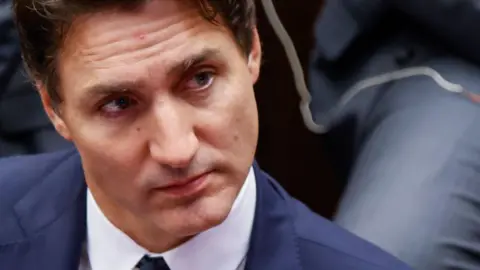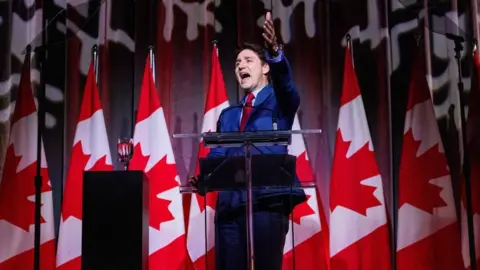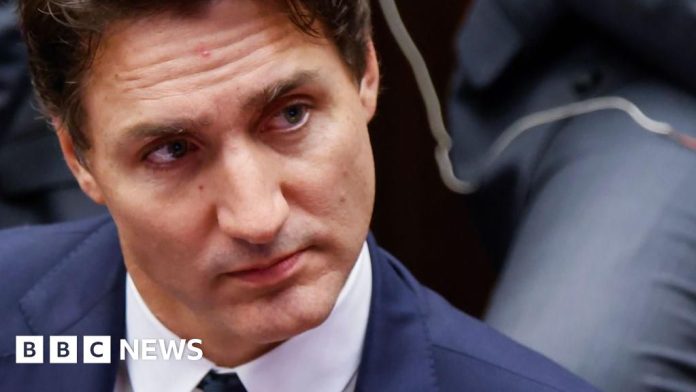 Getty Images
Getty ImagesIt was one of the worst weeks of his political career, and Canadian Prime Minister Justin Trudeau was ringing in the season.
At the Liberal Party’s annual holiday gathering, Trudeau put on his party face, despite being blindsided the day before by the snap resignation of one of his most trusted allies, Finance Minister Chrystia Freeland, just hours before she was due to deliver an economic statement in Parliament.
But even as some members of his own party were calling on him to leave, the prime minister struck a resolute, defiant tone as he addressed the party faithful in his dark blue suit and tie.
He alluded to his “difficult” week, comparing it to a family fight.
He discussed being “audacious” and “ambitious” in the face of adversity, and made pointed digs at his political rival, Pierre Poilievre, the leader of the opposition Conservative Party of Canada.
Pundits remarked afterwards that it sounded a lot like a campaign speech, and that despite the latest political turmoil, Trudeau appears to be digging in.
That stance did not change on Friday, even after the leader of the country’s progressive New Democrat Party (NDP) Jagmeet Singh said he would introduce a motion to topple Trudeau’s government in the new year. It was the support of the NDP that had kept the Liberals in power. An election now appears imminent.
Yet Trudeau has so far given no indication that he will resign soon, though he reportedly told fellow party members that he would take time over the winter holiday to think about what to do.
Political observers say Trudeau has often shown a streak of defiance when he is under pressure, something that has helped him weather a number of controversies in his nine years in power.
And he has often been underestimated, such as when he won a majority government in 2015 at the age of 44, despite being portrayed by his political opponents as something of a dilettante.
But as pressure mounts on him to resign, some of those same experts say he may need a new strategy.
 Reuters
ReutersProving his doubters wrong
When Trudeau first ran for prime minister, three words followed him around: Just not ready.
That phrase was the tagline of an attack ad played repeatedly throughout the country as he tried to unseat the incumbent Prime Minister Stephen Harper, a Conservative who had been in power since 2004.
It conveyed common criticisms he faced at the time about his young age, his relative lack of experience and his winding path to politics.
Trudeau “sort of meandered around” in his early life before becoming a drama teacher in Vancouver, said Canadian historian Raymond Blake, seemingly insulated as the well-known and wealthy son of former Prime Minister Pierre Elliott Trudeau.
But not long after entering politics, Trudeau adopted a fighting stance.
It is a trait that some say he learned from his father, who was known for his charismatic yet combative leadership style, and who is famous for his catchphrase of “just watch me,” which he glibly told a reporter at the height of a political crisis.
“His father had an image of really being a resilient, very tough politician,” said Lawrence Martin, a long-time Canadian political columnist based in Washington DC.
The younger Trudeau went on to defy the odds himself by pulling off a historic win for his Liberal party, taking them from third-place in parliament to a majority mandate in his first federal election.
“This kind of makes him feel that he can overcome big obstacles,” said Mr Martin, adding that, politically, Trudeau operates with “a hyper amount of self-confidence”.
Trudeau’s path to power turned bumpy once he had assumed office, after he became involved in a number of political scandals.
In his first term, Justice Minister Jody Wilson-Raybould – the first indigenous woman to hold the job – quit over what she described as attempts at interference and “veiled threats” from top government officials seeking a legal favour for a firm facing a corruption trial.
As he vied for a second term in 2019, Trudeau’s re-election campaign was rocked by images that were released showing him as a younger man donning brown face on at least three occasions.
And a year later, in 2020, Trudeau faced yet another ethics scandal involving a potentially large government contract for a youth charity that had worked with Trudeau family members.
But in the face of every setback, Trudeau held on to power. He won re-election twice, making him the longest-serving leader of his G7 peers.
“Trudeau has survived so much,” Prof Blake said, noting that his political successes and leadership have won the loyalty of many in his party despite the scandals.
Is Freeland’s exit a turning point?
While Trudeau has weathered many storms, there are signs that his time may be up.
For one, history is not on his side. Only one Canadian prime minister, Sir John A MacDonald – the country’s first – served four consecutive terms.
Trudeau is also working against a sinking popularity. A September poll from Ipsos suggested around two-thirds of Canadians disapprove of him. Just 26% of respondents said Trudeau was their top pick for prime minister, putting him 19 points behind Conservative leader Poilievre.
And then there’s the slowly dwindling support within Trudeau’s own party. So far, at least 18 Liberal MPs have called for their leader to step down.
“He’s delusional if he thinks we can continue like this,” New Brunswick MP Wayne Long told reporters this week.
“It’s unfair to us MPs, it’s unfair to the ministers and most importantly it’s unfair to the country. We need to move on with a new direction and we need to reboot.”
According to Long, who has driven the push to remove Trudeau, as many as 50 of the 153 Liberal MPs want him to quit immediately. Roughly the same number are Trudeau loyalists, he said, and the rest are on the fence.
“There’s still some party loyalists who like him and, you know, want to still support him,” said Mr Martin, the DC-based columnist. “But if you had a secret vote of Liberal caucus about whether he should stay on or not, he would be defeated handily.”
The prime minister is also seemingly driven to stay by his disdain for his political opponent Poilievre, Mr Martin observed.
“He does not want to back down, and he does want to take on Pierre Poilievre, whom he detests,” he said.
Trudeau’s stubborn perseverance in the face of a dismal political forecast has drawn comparisons to outgoing US President Joe Biden, who abandoned his candidacy months before the November election only after mounting internal pressure.
Prof Blake said that Trudeau’s legacy, like Biden’s, will hinge on how he exits. Fighting a losing battle, he said, could give Trudeau “a lasting scar”. But the prime minister has a remarkable ability to survive, he noted.
“He’s been a survivor, and he hasn’t done what’s normal. Will normal – whatever it is – fall into place this time? Perhaps, but I’m not convinced.”
Trudeau’s dilemma is also similar to one faced by his father, who won three elections in a row, and went on to win a fourth after leaving power for less than a year.
But by 1984, more than 15 years after first becoming prime minister, the elder Trudeau – like his son now – faced dire polls. It seemed clear he would not win the next election if he stayed on. He decided to step down, telling the public that he made the decision after taking a walk in an Ottawa snowstorm.
Since then, the term “walk in the snow” has become synonymous with political resignation in Canada. This Christmas, it remains to be seen whether Trudeau will take his own walk.

